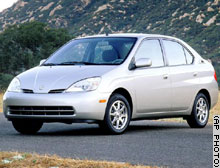 Hybrids cheap to make, Toyota says
Hybrids cheap to make, Toyota says Hybrids cheap to make, Toyota says
Hybrids cheap to make, Toyota says
Thursday, October 2, 2003 Posted: 9:12 AM EDT (1312 GMT)
Gas and electricity power the Prius.
------------------------------------------------------------------------
Story Tools
------------------------------------------------------------------------
YOUR E-MAIL ALERTS
Follow the news that matters to you. Create your own alert to be notified on topics you're interested in.
Or, visit Popular Alerts for suggestions.
Manage alerts | What is this?
TOYOTA CITY, Japan (Reuters) -- Toyota Motor Corp showed off the production site of its gasoline-electric hybrid cars to journalists for the first time on Thursday with a powerful message: they don't have to be expensive to make.
Not long ago, many leading auto makers, including the world's biggest, General Motors Corp, questioned the benefit of developing hybrid cars, arguing they are merely an interim solution before zero-emission fuel-cell vehicles take over.
They accused -- possibly accurately -- Toyota and Honda Motor Co, the only other mass-producer of gas-electric hybrid cars, of selling them at a loss given the labor-intensive assembly required.
There may have been some truth to that argument before, but no longer, says Toyota, which launched its second-generation Prius hybrid sedan in Japan last month.
"We used to build the previous Prius on an exclusive assembly line at the Takaoka plant, and later at Motomachi," said Kenji Takahara, head of administration at neighboring Tsusumi plant, which now builds the Prius.
"Now, it shares a line with four other mass-production sedans," he said.
That's a big and necessary step for Japan's top auto maker as it aims to offer the hybrid option on most of its models in the not-too-distant future. Toyota is hoping to sell 300,000 of the fuel-efficient vehicles a year starting mid-decade.
Hybrids use electric motors and battery packs to improve fuel efficiency, adding power during acceleration and reclaiming energy when braking and coasting. Toyota says the Prius gets 35.5 km per liter of gasoline, which is over 80 miles per gallon.
Visual comparisons with the production method for the previous Prius, launched in late 1997, are difficult since journalists were never allowed to visit the assembly site.
But the numbers speak for themselves: the Prius's current assembly line rolls out around one car every minute, versus one every eight to 10 minutes for the previous model. And although it needs to pass through 11 extra stops during assembly compared with a regular car, productivity has improved by at least 15 percent for the current model, a factory official said.
"This is proof that mass production of the Prius has started in earnest," Takahara said.
Blending in
Touring through the factory floor in this central Japanese city named after the auto maker, it is indeed difficult to tell there's any difference between a hybrid and a conventional car.
"The worker is installing the hybrid engine system into the Prius just like a regular gasoline engine," assembly manager Yoshihisa Nagatani says proudly, pointing at the shell of a Prius hanging on an overhead conveyor belt as it follows a Camry.
In addition to some tweaking of the assembly line required with any new model launch, mixed assembly has been made possible by the huge increase in projected sales, Toyota says.
The auto maker is aiming to sell 76,000 units of the new Prius a year globally, with 36,000 of that in Japan. Actual sales of the previous Prius was 28,000 units last year.
But the sales target is already looking extremely conservative. Toyota said on Thursday that orders in Japan reached 17,500 units in the first month. In the United States, where it goes on sale this month, orders topped 10,000 as of September 24.
Reflecting their popularity, every other car on the five-model assembly line at the Tsutsumi plant is a Prius.
In contrast, rival Honda says low volumes are forcing it to practically hand-build its Insight hybrid model, much like the NSX and S-2000 sports cars. Japan's second-largest auto maker admits that after four years of selling hybrids, it barely makes any profit on them.
Nevertheless, Toyota's feat in mass-producing its hybrid car should be an encouraging sign for other rivals as they follow Japan's top two auto makers into the market.
Among them, GM and Ford Motor Co are planning to introduce their first hybrid vehicles later this year. But with Ford admitting to doing so at a loss initially, it could be a while before they can emulate Toyota's success.